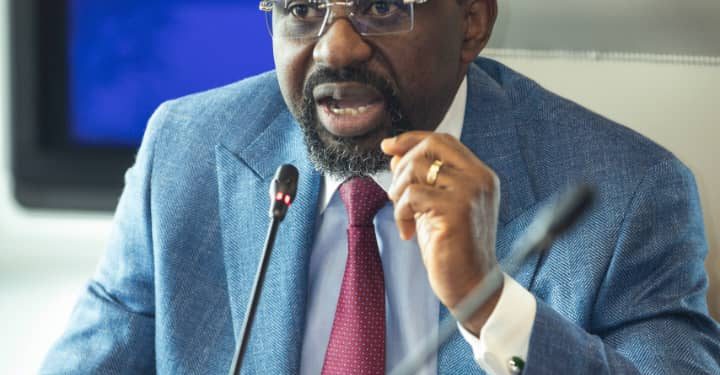Central Bank Mulls Sukuk Bonds to Bridge $37.9bn Infrastructure Gap, Deepen Ethical Finance
The Central Bank is considering the introduction of Sukuk bonds as a credible, ethical alternative to traditional borrowing instruments, as part of ongoing efforts to close the country’s widening infrastructure financing gap, estimated at US$37.9 billion annually.
The move is being driven by the Bank of Ghana (BoG) under a broader agenda to establish a Non-Interest Banking and Finance (NIBF) system, aimed at enhancing financial inclusion and promoting ethical finance practices in the country.
Addressing religious leaders at a high-level stakeholder engagement in Accra, BoG Governor, Dr Johnson Asiama, described Sukuk as a viable financing mechanism that could offer Ghana a more sustainable path to infrastructure development amid tight fiscal constraints.
“In the face of fiscal constraints, innovative instruments such as Sukuk bonds offer a credible alternative to conventional debt,” said Dr Asiama.
Sukuk bonds differ from conventional bonds in that they are asset-backed and interest-free, consistent with Islamic finance principles. The instrument has gained traction globally, with countries such as South Africa and Nigeria using it to raise billions for infrastructure development.
In 2014, South Africa issued a US$500 million Sukuk, which was oversubscribed by four times. The country returned to the market in 2023 with a US$1.1 billion multi-tranche issuance. Nigeria, since launching its sovereign Sukuk programme in 2017, has raised approximately US$2.37 billion, financing the construction and rehabilitation of over 4,100 kilometres of roads and nine major bridges.
BoG engages clergy on ethical finance reforms
The Governor emphasised that BoG considers the clergy a strategic partner in building public confidence in the ethical finance model. He noted that the engagement with religious leaders forms part of nationwide consultations towards establishing the necessary institutional, legal, and regulatory framework for NIBF in Ghana.
“This engagement forms a critical cornerstone of our broader reform agenda,” he remarked.
“The clergy have long been our partners in fostering financial literacy, and their influence, insight, and feedback are indispensable in building a system that reflects Ghanaian values.”
Dr Asiama explained that Non-Interest Banking is not a novel experiment but a fast-growing global model with an estimated balance sheet size exceeding US$5.5 trillion as of end-2025.
The model operates on the basis of profit-and-loss sharing, partnership arrangements, and real asset-backed financing, and prohibits interest-based transactions and speculative activities.
NIBF as a driver of inclusive and ethical finance
According to Dr Asiama, NIBF promotes responsible investment, financial inclusion, and economic justice, while discouraging financing of industries such as alcohol, gambling, adult entertainment, and arms manufacturing.
“All financial transactions under NIBF must be backed by tangible assets or services, directly linking the financial sector to the real economy,” he stated.
The Governor cited examples of African countries like Kenya, Uganda, Tanzania, and Nigeria, which have developed NIBF frameworks to broaden financial access. Outside the continent, advanced economies including the UK, Malaysia, Singapore, Japan, and the Netherlands have also embraced the model to diversify their financial systems.
Dr Asiama called on the religious community to take an active role in supporting NIBF, urging them to become advocates for ethical finance and help shape a financial system that aligns with Ghanaian values and principles.
“Today’s engagement is not merely symbolic — it is a call to action for collaboration, awareness creation, demystifying misconceptions, and commitment to give NIBF a chance to be nurtured within our banking and finance space,” he said.
The Governor stressed that the successful rollout of NIBF in Ghana would require more than regulatory reforms — it demands collective ownership, trust, and moral leadership.
“This is our shared responsibility — one that demands inclusiveness, trust, and ethical commitment,” he concluded.









That’s good step to establish such financial institutions for the development and progress of the country Ghana.